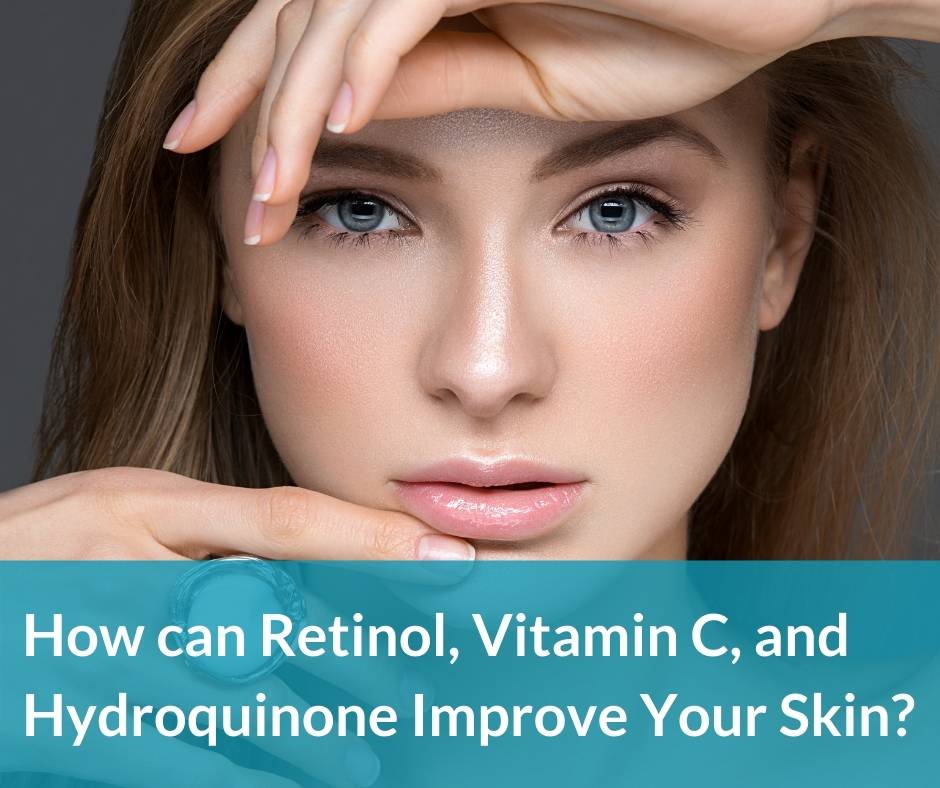How can Retinol, Vitamin C, and Hydroquinone Improve Your Skin?What do retinol, vitamin C, and hydroquinone have in common? Adding these three key ingredients to your beauty regimen can make your skin look clearer, healthier, and more youthful over time. But WHY are they so beneficial? And how do they work? What is retinol?Retinol is a form of vitamin A, and has become a hugely popular skincare ingredient (as an over-the-counter version of retinoids). Retinol’s molecules are small enough to penetrate the skin’s outer layer (the epidermis) and reach the middle layer (the dermis). Retinol helps to neutralize free radicals — unstable molecules have the potential to harm cells and human DNA. And by doing so, retinol stimulates the production of collagen (the skin’s main structural protein) and elastin (a protein making connective tissues elastic). Both are crucial to help combat the development of sagging skin as you age. This process also reduces the visibility of enlarged pores, wrinkles, and fine lines that can make the skin appear older. And as if all this wasn’t enough, retinol can exfoliate the skin to achieve a better texture. Retinol may be particularly beneficial if you have acne: it unclogs pores and prevents blemishes from forming, leaving the skin clearer. Retinol’s ability to balance hydration levels in skin can help to retain moisture and ease dry skin too. It’s also believed that retinol may help to improve hair growth and reduce hair loss when used alongside minoxidil (a common ingredient in over-the-counter hair treatments). How can you get retinol?Retinol can be found in a variety of foods, including:
You can also take advantage of retinol through skincare products. One option is The Perfect Derma Peel, which contains numerous powerful ingredients, one of which is retinoic acid. Retinol is converted into retinoic acid upon absorption by the skin. Other ingredients include TCA, Phenol, Glutathione, and kojic acid. The Perfect Derma Peel is designed to improve the appearance of acne scars, sun spots, and aging complexions. What is vitamin C?We all know vitamin C is good for us — we just may not know why. Well, first and foremost, it’s an antioxidant, which fights oxidation and protects cells against free radicals. But vitamin C is also a powerful aid to healthy skin. One of vitamin C’s primary benefits is its contribution to collagen production. This becomes more important as you age: the body produces less collagen, and the skin starts to sag due to its reduced elasticity. As a result, vitamin C can play a part in slowing age-related changes in the skin and promote a firmer complexion. Vitamin C also lightens dark patches of skin, caused by hyperpigmentation, by inhibiting the enzyme responsible for melanin production. Melanin is the pigment that gives the skin its color, but too much of it can create dark spots on the face, arms, or in other areas on the skin. Excess melanin production might be triggered by:
Another benefit of vitamin C is that it’s an anti-inflammatory, so it reduces redness/skin inflammation across the body. If used topically, vitamin C may soothe redness and improve the skin’s appearance. Vitamin C also increases iron absorption, helpful for healing skin damage and wounds. How can you get vitamin C?Oddly, the human body CANNOT produce vitamin C, due to a mutation in the gulonolactone oxidase gene. Fortunately, vitamin C CAN be found in a huge range of foods, IV therapy treatments, and topical skincare products. Vitamin C-rich foods include:
But food has to pass through the digestive system first, which can decrease the amount of vitamin C that reaches your system. This is why topical or intravenous solutions may be more beneficial if you want to reap the rewards of using vitamin C. For example, Astra Medicare’s Vitamin C IV Therapy delivers the vitamin straight into your bloodstream, to help stimulate collagen production, fight free radicals, and boost your immune system. What is hydroquinone?Hydroquinone is a less well-known ingredient than vitamin C, but it’s well worth considering. This reduces the number of melanocytes in the body, which produce melanin. Increased melanocyte production and the resulting melanin are responsible for hyperpigmentation, so hydroquinone’s ability to bleach the skin makes it an effective ingredient for treating this common condition. Overall, using hydroquinone can lead to a more balanced skin tone across a period of weeks or months. But it can also be used to treat various other skin conditions, such as freckles, acne scars, melasma, and age spots. However, you should use hydroquinone with care if your skin is particularly dry or sensitive. There’s a small risk that it could exacerbate dryness and/or irritation, though this may improve as your skin acclimates to it. It’s also worth noting that hydroquinone is most effective on people with fair skin. It could actually make hyperpigmentation more visible if you have darker skin, though that’s not guaranteed. If you’re unsure about using hydroquinone, speak to a skincare specialist. They’ll discuss the benefits and potential side effects in detail, to help you make an informed decision. How can you get hydroquinone?You can find hydroquinone in numerous skincare products. One option is the Alumier Lightening Lotion. This uses a combination of hydroquinone and licorice root, both of which are known to:
How do you know which of these ingredients is best for you?If you want to improve your skin, experimenting with the three ingredients above could lead to real results! But it’s crucial that you know how to use them properly before you start. Our skincare experts are here to help you find the right solutions, so book your consultation today!
0 Comments
Your comment will be posted after it is approved.
Leave a Reply. |
AuthorDedicated and passionate Astra Medicare staff. Archives
June 2024
Categories
All
|


 RSS Feed
RSS Feed